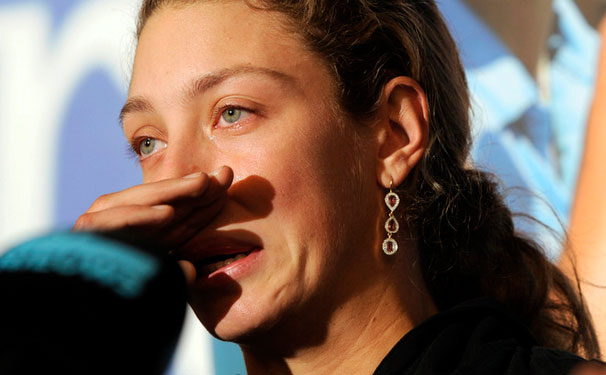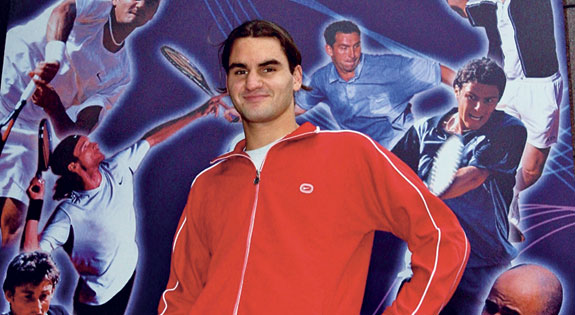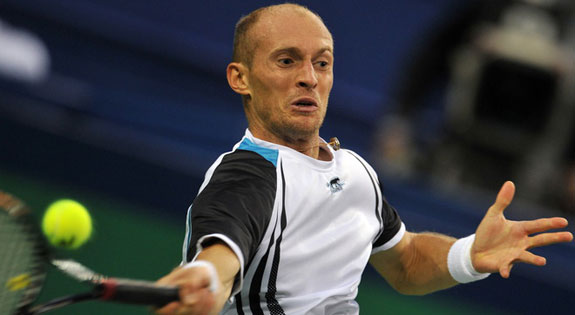It will be 50 years ago on Monday, February 1 that Rod Laver won his first major championship – the Australian Open.
The man whose name now graces the Center Court at the national championship of his homeland finally broke through and won the 1960 Australian Championships, that year played at the Milton Courts in Brisbane. Following his epic-final round win over countryman Neale Fraser, Laver went on to win 10 more major singles titles, including an unprecedented feat of registering two Grand Slam sweeps of all four major titles in the same year in 1962 and 1969.
Laver touches upon his breakthrough win 50 years ago in his newly re-released book THE EDUCATION OF A TENNIS PLAYER that “The Rocket” co-wrote with Bud Collins. THE EDUCATION OF TENNIS PLAYER ($19.95, New Chapter Press, www.NewChapterMedia.com) primarily focuses on Laver’s second Grand Slam season in 1969, but also serves a life memoir discussing other important matches and events in his life. The book was updated with new content and is currently in stock early on www.amazon.com and will be available in book stores by April 1.
The following is a partial excerpt from Chapter 5 of THE EDUCATION OF A TENNIS PLAYER called THE FIRST LEG OF THE GRAND SLAM: THE AUSTRALIAN where Laver reminisces about his first major win in 1960.
I arrived at Milton and walked out onto the stadium grass to look around and I thought back nine years. My first major title was the Australian in 1960, when I got that premature notion I could keep going through a Grand Slam. It was a marvelous win for everybody, not just me, because by beating Neale Fraser of Melbourne in the five-set final I became only the second Queenslander to win the national championship since 1905.
Eight thousand were in the stands, among them a good-sized gathering of friends from Rockhampton, crowing for me every chance they got. Of course it was my crowd, considering the circumstances. Fraser was the No. 1 amateur in the world then and he had a match point on me in the fourth set. I slipped away and had seven of them on him at 7-6 in the fifth on my serve. He busted loose every time, but finally I held serve for the title.
A lot of people thought it was the most exciting match they’d ever seen. That was how I remembered Milton, for that struggling, unexpected triumph which had Australia talking, and started my collection of major championships. Others may have remembered it, too, but few bought tickets to witness the hero’s return. Neale Fraser showed up, only as a spectator. And he was in on a free ticket.
A young Italian named Massimo di Domenico gets a mention as the first of twenty-six victims in the Grand Slam. The grass wasn’t as fast as usual at Milton, and I could experiment and get the feel in beating him, 6-2, 6-3, 6-3. Brisbane is always hot, but the heat seemed more blistering to me, though I’d grown up in the area. I wasn’t used to it after years away from Queensland. I knew it in my next match against Roy Emerson, and I’m happy we played at night. Dew makes night tennis on grass a bad, slippery idea.
But we didn’t miss the sun at all, and the crowds improved a little. If there was one match that did revive some of the old tennis feeling in the town it was Emerson and Laver. We were the local boys who had made it better than any Queenslanders.
We’d played so many times that sometimes our matches seemed as familiar as summertime reruns on TV. No matter what happened, though, we became better and better friends, doubles partners, very close, but Emmo would cut out his heart to beat me. He’s a tremendous competitor, unbelievable when it comes to fitness. I think he’s the hardest-working athlete I’ve ever seen. Emmo and I come from the same kind of background, out in the bush. He was brought up on a dairy farm at a little place called Blackbutt, and he got those really strong wrists by milking cows. I don’t know whether he used the continental grip on the cows, but they knew he was going to hang on until they produced their daily quota. He must have milked thousands of them. When Emmo began to show a high aptitude for tennis, his family sold the place and moved to Brisbane. They had a court on their property, but his father wanted Emmo to be able to get the best competition and instruction.
At first, in Brisbane, Emmo couldn’t get used to taking a bath whenever he felt like it. “Out on our place, water was scarce and precious. It was almost rationed,” he told his new friends. “I thought we were going to run out in Brisbane, and I never used much until I was certain we could have as much as we wanted.”
Emmo has a very rigid code for himself, and we like to think this is the way of a dinkum (honest-to-God) Aussie. Although he has had numerous injuries during his career, one of them costing him his fourth Wimbledon title and the other possibly costing him a fifth—and making it easier on my Grand Slam in 1962—he never, never talks about them or implies that an injury was the cause for defeat.
“Once you walk onto that court,” said Emmo, “you’re signifying that you’re in perfect shape. Otherwise don’t go on. Only two things happen. You win, or your opponent beats you. Injuries have nothing to do with it.” Any talk of injury, as an excuse, grates on Emmo. He once snorted about the chronic moaner, Niki Pilic: “I never beat Niki when he was well.” You’ll never hear Emmo complain, but you will hear his footsteps all through a match as he charges the net incessantly, and sometimes you’ll hear that piercing laugh of his, and be glad. That’s Emmo’s way of releasing the tension when he’s bungled a shot he should have had.
Emmo gleamed on a court, the sun or the lights glistening off his patent-leather hair and the gold fillings so prominent in his front teeth. The sight of him is as much with me as anything else in the game because we’ve played each other so often in important matches. He has been my downfall, and I his. Titles of our own nation – and numerous others – have been at stake often when we’ve met, and we’ve meant a lot of disappointment for each other. During the two Slams, in eight tournaments, I’ve had to get past Emmo five times.
By 1960, Emmo and I were the rising players in Australia while Neale Fraser was briefly at the top. In the semis of the nationals at Brisbane, I somehow pulled up from 2-5 in the fifth to win five straight games and beat Emmo. Then I knocked off Fraser in that wild final. That delayed Emmo’s winning his first Australian title, which he got a year later by going through me in the final. Later, in 1961, after winning Wimbledon, I was favored to win my first U.S. Championship. But there was Emmo in the final, winning his first instead, and me shaking his hand and saying, “Well played, Emmo.”
Although Emerson never attained a Grand Slam, he won more of the major titles than anybody else, a total of twelve singles — six Australian, two U.S., English, and French – and 16 doubles. At the close of 1969, I was one behind him in singles with eleven, ready to pass – but didn’t.
Even though Pete Sampras did surpass him in 2002 with a 14th major singles title, probably no one will overtake his total stash of majors: 28.
Laughed Emmo, “I didn’t even know I held the singles record until it came out in the press that Pete was chasing me. We didn’t pay any attention to records.”
The grass was slick when we went on. Because of the slipshod scheduling it was after 9:00p.m. Emmo’s a slow starter. So am I, but he was slower and I got the first set pretty quickly. And the second. But he took the third, and he had a break and was serving at 7-6 in the fourth, looking like he’d catch up. It was just about midnight now, the crowd excited.
The year would be marked by patches like the one I struck then. I began hitting my returns harder, and they were buzzing with topspin. Emmo was charging in, but he missed a couple of volleys. I broke back, and kept going for a run of three straight games and the match, 6-2, 6-3, 3-6, 9-7.
There wasn’t much time to have a beer and relax because after I’d showered and talked to the reporters it was one in the morning and I was due back to play Fred Stolle in the quarterfinals in ten hours. Hardly time for breakfast.



